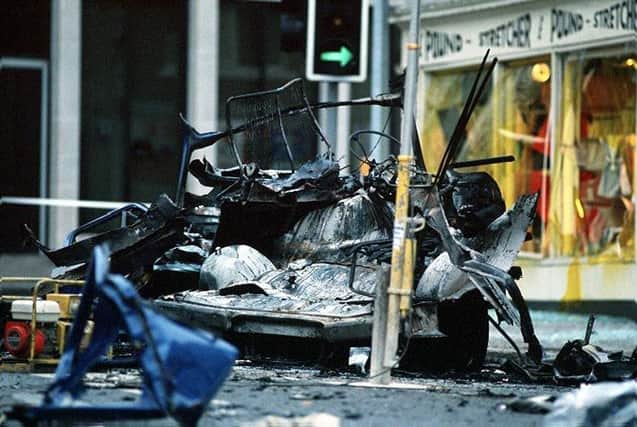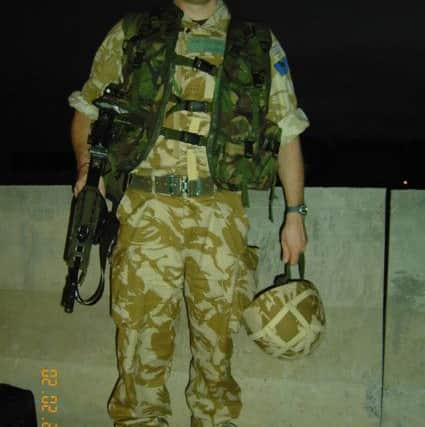It suits MoD to suggest no link between service and suicide: ex-colonel


It suits the government to suggest there is no link between military service and suicide, an ex-colonel has claimed.
Fifty-three-year-old former Col Philip Ingram was the most senior British intelligence officer in western Iraq in 2005 when a combination of pressures in his personal life and the brutal deaths of friends wore him down.
Advertisement
Hide AdAdvertisement
Hide AdOriginally from Co Tyrone, he now lives in Birmingham. He is thought to be the most senior Army officer to have spoken publicly about his PTSD and close brush with suicide, detailed in last week’s News Letter.


Although there are no official figures to bolster his position, he believes suicide among veterans is a significant problem, based on “hundreds” of people he says have contacted him since he went public–- and increased cases being reported in the media.
He believes that 14-16 veterans have taken their lives since 18 April this year, based on research by veterans themselves.
Advertisement
Hide AdAdvertisement
Hide Ad“In official statistics the studies by the Ministry of Defence into serving personnel and studies by likes of Kings College London will say there is no difference in suicide rates between civilians and veterans and that in fact in some cases there is a lower percentage chance of veterans suffering mental health illnesses and suicide.
“But I think if you look at the anecdotal evidence out there and the constant stories in the media it would suggest that there is a very different story. And the one question we have to ask is ‘why is there a difference between the perception of what veterans like myself are hearing on a daily basis and what some of these larger studies are bringing out?’.”
He thinks that the reason for the disparity is that when veterans have mental health issues or die by suicide that there is no recognition or record that they have been veterans.
“There is only one health authority in the UK that has got a policy of asking its patients whether they are veterans when they go to see a GP and that is Scotland. So I don’t know how people can gather statistics.”
Advertisement
Hide AdAdvertisement
Hide AdHe added: “It suits the government’s purpose to suggest that there is no increased correlation between military service and mental health issues and suicide because as soon as you get that correlation then it becomes a duty of care perspective.”
Then MoD would have a greater level of responsibility to look after those that have been “damaged” in their job. “And then it would have a responsibility to make sure that appropriate systems are put in place to rectify that damage or provide compensation for how it has affected people’s lives. And I don’t think they could afford that.”
The MoD’s position is that he is one of a very small percentage of veterans, in low single figures, that have suffered in this way. But he believes the problem is significantly bigger.
He explained why. “The anecdotal evidence, the stories that I am getting from a very large percentage of friends and veterans who are contacting me and telling me their stories, and personal stories of people that I have interacted with.”
Advertisement
Hide AdAdvertisement
Hide AdHundreds of people have contacted him since he told his own story publicly, he said.
He warns about delayed onset PTSD or other mental health issues that may not manifest until up to 14 years after the related events.
“There is no mechanism to record such illnesses as linked to military service. And there is no desire within the MoD to have that recorded”.
There are some disputed figures out there which say that more Falklands veterans have died by suicide than were killed by enemy action, he said.
Advertisement
Hide AdAdvertisement
Hide AdHe proposes that the NHS across the UK should have a mechanism to record if someone is a veteran. He would like to see GPs screen veterans regularly for mental health. He also wants to see the stigma around mental health tackled and more open discussions about it in the military.
“I have lost a high percentage of my military friends. I put that down to the feeling that they don’t want to catch it,” he says.
The MoD had processes in place to address his problems, he said, but he was not put through them. Most of his soldiers that he put through them for similar issues recovered, but in his case the option was “ignored” he said
He finds it a “frightening thing” to see pictures of soldiers in uniform going out and doing charitable fund-raising activities.
Advertisement
Hide AdAdvertisement
Hide Ad“They are shaking a bucket for these charities that are going to look after them when they get out because the government won’t do it. Effectively you have soldiers in uniform having to beg the public for additional money to look after them when they get out.”
The truth, he said, if that this is actually the MoD’s responsibility.
“That is my point”.
An MoD spokesperson said suicide is significantly lower in the armed forces than in the general population and that it takes the issue very seriously. “The reasons people take their lives can vary and are not necessarily linked to their service,” it said. Help is available on two 24-hour Combat Stress help-lines and the MoD is working with charities to enhance support, it added.
Meanwhile, a senior coronoer has said that the creation of a system to help coroners track suicides of veterans would help tackle the tragic deaths among former forces personnel who struggle to cope with life.
Advertisement
Hide AdAdvertisement
Hide AdJP Investigations wrote to coroners across the UK to ask if they had any figures on veteran suicides. The typical response of those that responded was that they had no facility for recording veteran suicides.
Mr Dewi Pritchard Jones, HM Coroner for North West Wales, said his IT system was “as old as Noah” and offered no means to record veteran suicides.
Asked if he thought it would be a good idea for UK authorities to track veterans for instances of suicide, he was positive about the idea.
“It would probably help to tackle this as in the US and Australia, but it will be a matter of resources and priorities,” he said. “Suicide is a favoured topic of public discussion at present. If they could track veterans and do something on suicide that be very helpful.”
Advertisement
Hide AdAdvertisement
Hide AdThe coroner for Northamptonshire Anne Pember took a similar view: “If this is a significant problem then those in authority should be aware of it,” she said. “It will help them to offer counselling, advice, support.”
• This veterans series continues all week.
HELPLINES;-
UDR/RI aftercare: 9042 0145
UDR Ben Fund: 028 9042 0652
Royal Irish Ben Fund: 9042 0629
Veterans UK (MoD pensions/compensation): 0808 1914218
The Samaritans: 116123
Lifeline NI 0808 808 8000
Alcoholics Anon: 0800 8177 650
Vets’ Gateway: 0808 802 1212
Combat Stress: 0800 138 1619
Help for Heroes: 01980 844280
RBL: 0808 802 8080
SSAFA: 080 731 4880